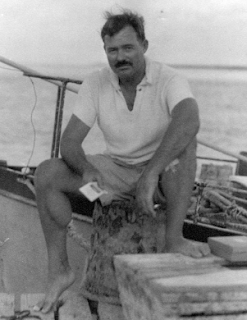"Nobody lives life all the way up except bull fighters."
Ernest Hemingway
Your love affair with Spain and Bull Fighting has begun! You write, "Spain is damn good in hot weather! Went down there about two months ago to study bull fighting and lived at a bull fighter's pension in the calle San Jeronimo in Madrid...the big Feria at Pamplona - five days of bull fighting dancing all day and all night - wonderful music - drums, reed pipes, fifes - faces of Valasqueze's drinkers, Goya and Greco faces, all the men in blue shirts and red handkerchiefs - circling, lifting, floating, dance. We the only foreigners at the damn fair."
You write of your passion for bull fighting, "It isn't just brutal, like they always told us. It's a great tragedy - and the most beautiful thing I've ever seen and takes more guts and skill and guts again than anything possible could. It's like having a ringside seat at the war with nothing going to happen to you."
That theme Hem, that theme of heart wrenching tragedy marked by brutality, courage and beauty, will surface multiple times in your letters and around various life events as you continue to weave the story of your life. I can't help but think that the combination of visiting your old WW1 sites with Hadley, and rehashing the events around those sites along with the raw and visceral pageantry of bull fighting triggered in you a pattern of remembrance that embraced the beauty of the tragedy of both war and bull fighting.
The all consuming celebration of the running of the bulls and the bull fights a Pampalona had to be similar to the drive to live every moment to its fullest, to grab life by the horns and never let go in the face of war and death. How many times in your life did you escape death and wonder, "Why me?"
1923 saw you continuing to work for the Toronto Star as a reporter as well as writing short stories for publication. The relationships you build with the likes of Ezra Pound and Gertrude Stein will provide the literary base you need to continue to hone your craft. 1923 was also a year where you had to adjust to the challenge of fatherhood, as John Hadley Nicanor Hemingway came into the world in October. You would travel back to North America for the birth, and take up residence in Toronto.
The birth of your son and your resignation from the Toronto Star in 1924 marked another turning point in your focus and career. By January, 1924 you will be back in Paris with Hadley and Bumby (your son) and back at the task of writing and working to get published.
During this time period, as you struggle to get published, as you write short stories and grab life by the horns taking it all in and experiencing its many faces, you continue to dial in your perspective and view and develop a language that will become easily identifiable with Hemingway. Your growing circle of literary friends and supporters are essential to you in maintaining perspective and momentum as you ride out the disappointment of rejection letters and evolve your capacity for self criticism and improvement.
The years 1923 to 1925 are packed with life experiences and learnings around writing, publishing, networking and maintaining balance and sanity through the ups and downs. Hadley proves to be an anchor during this time and the freedom you've been able to experience through the influence of her trust fund has allowed you to indulge in full immersion in ways that would not have been possible otherwise.
My heart breaks for you, dear Hem, as you continue to suffer under the disapproval and rejection of your parents regarding your writing. In your letter to your father, dated March 20, 1925, you share, "The reason I have not sent you any of my work is because you or Mother sent back the In Our Time Books. That looked as though you did not want to see any. You see I'm trying in all my stories to get the feeling of the actual life across - not just depict life - or criticize it - but to actually make it alive."
Your sister Marcelline would recall that your parents had been "shocked and horrified" by the book that they returned to the publishers. Your father, on the other hand, would simply share with you his lament of not having seen or been able to read any of what you were publishing. It's a confusing message at best.
Through the influence and friendships of the likes of Ernest Walsh and Ethel Moorhead you will continue to grow and develop your capacity to convey those feelings of actual life and the scenes that will bring your stories alive. You write to Ernest Walsh on April 6, 1925, "You certainly can make a man feel good when you write about - The Undefeated. Picks me up. Makes me feel it's worth while working. And I need it."
Keep at it, my friend. Your capacity for finding expression and engaging others through your writing is growing stronger all the time. Every journey begins with the first step, and yours is a worthwhile one, to be sure.
Warmest Regards,
Betsy

No comments:
Post a Comment